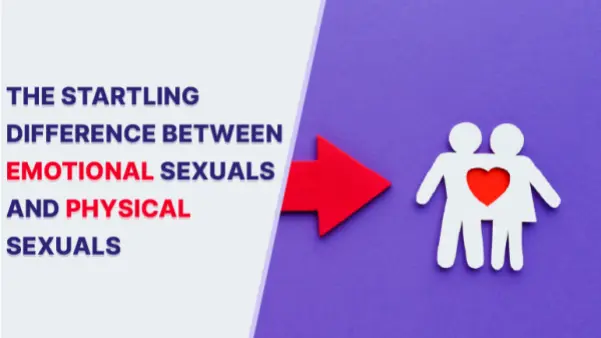Introduction
All relationships that are dear to us hold a special place in our hearts. But our romantic partner holds the most special place, isn’t it? However, despite this special place, you and your partner can have differences. Now, these differences occur because of our personality traits. In this article, let’s explore a unique theory regarding the sexual personality traits of romantic partners given by Dr. John Kappas. This theory is called the “Theory of Emotional Sexuals and Physical Sexuals” or the “E&P Model.”
“Love recognizes no barriers. It jumps hurdles, leaps fences, penetrates walls to arrive at its destination full of hope.” – Maya Angelou [1]
Who are Emotional Sexuals and Physical Sexuals?
I am a huge movie buff. I grew up watching a lot of romantic comedies, specifically those that ended in marriage. I saw how the couple was nervous before the wedding, making sure everything was perfect. I saw the fights, the almost calling off of the wedding, and the couple getting back together again to have the most beautiful wedding ever. You know how it is, right? Very ‘The Notebook’ sort of feels, I know.
But, have you ever thought why these differences even come up in the first place?
These differences come up because the sexual personality traits of both people in the relationship are quite the opposite. You might have heard of the saying, “Opposites attract,” right? Dr. John Kappas proved it to be true.
There are two different types of sexual personality traits – emotional and physical. You might feel that emotionals would be people who work on emotions, and physicals would be people who only understand touch and feel when needed. But this might come as a huge shock to you.
Emotional sexuals (ES) are people who are head-ruled people who don’t talk much, with work being their number one priority. Physical sexuals (PS), on the other hand, are heart-ruled people who talk a mile a minute, with sex and relationship being their number one priority [2].
So, as you see, they are totally opposite characters. But in a relationship, these two different people come together and can live a harmonious life. They practically complete each other, as we will be able to see going forward in the article.
Dr. John Kappas’ Theory of Emotional Sexuals and Physical Sexuals
Dr. John Kappas was a well-known hypnotherapist who developed the E&P model to understand and predict the behaviors of his clients while in relationships.
His theory explains that there are certain subconscious forces that instruct us on how to react in a certain situation. These behaviors of ours emerge from how we were treated as children and how we saw our parents’ love for each other. Whatever we see goes into our subconscious and forms our opinion, and how we behave/ respond once we are in relationships mostly depends on that. Having said that, our subconscious mind is what decides who we will choose as a partner for ourselves, how we will respond to them, and what our expectations from them would be in the relationship. We judge our partners based on the relationship of our parents many times [3].
Dr. Kappas even believed that each partner has a dominant sexuality type. This dominant sexuality type is determined by our secondary caregiver, who is our father in most cases. So, if we understand these dominant sexuality types, we would have a more loving and long-lasting relationship [4].
What is the Basic Difference Between Emotional Sexual and Physical Sexuals?
When we try to differentiate between ESs and PSs, it is important to note that each of us is never 100% Emotional or 100% Physical. So, we all will have some overlapping traits of both [5].
Characteristics that ESs have:
- They are head-ruled people.
- They think deeply before reacting.
- For them, the areas of life that are most important to them are their career, their hobbies/interests, followed by their relationships/family, and lastly, sex.
- Emotional females have other emotional friends.
- Emotional males do not have a lot of friends.
- Do not feel very deeply.
Characteristics that PSs have:
- They are heart-ruled people.
- They react first and then think.
- For them, the areas of life carrying the utmost value are relationships/sex, followed by family, then hobbies/interests, and lastly, career.
- Their body is their primary medium of expression and communication.
- Physical females have physical male friends, usually the only female in a largely male-dominated group.
- Physical males have physical male friends too.
How do Emotional Sexuals and Physical Sexuals Behave in a Relationship?
The Physical, operating from the usual one-down, needy position, fails to anticipate Emotional behavior. For a PS, relationships run on the ‘together forever’ phenomenon. When they discover that ESs don’t feel that way and that they are ok with breaching commitment, it gives PSs a terrible shock! ESs may, on the other hand, think that it wasn’t their fault. They were always clear about their stand. When a PS discovers that the ES partner is disengaging from the relationship, they find it traumatic and humiliating [6].
In a fallout, PSs generally suffer more. They engage themselves too much in the relationship. They keep old cards, gifts, etc, as memories. When PSs hear the words divorce/break up, they float back to happier memories, long walks and talks, and so on. Their impulse is to hold on to the relationship and put it back together. To do this, they approach the partner more often, which bothers the ES further. The less receptive the ES is (especially when there is an option waiting for them), the more committed the PS becomes to regaining the ES’s affecting. Thus, despite a strong sex drive, they do not drift to other partners, even if someone tries hard to get them.
The PSs are often unable to re-establish intimacy with any other partner for weeks, months, or – in the extreme – even years after the breakup or divorce.
On the other hand, the ES perceives the PS’s attempt to rekindle the fire as weak or even forcible. The partner may even feel angry or disgusted and will be more determined to end the relationship. ESs may perceive the PSs as a crybaby who keeps on clinging and cribbing.
The Emotional partner usually approaches the end of the relationship with relief, always acutely aware of the imperfections in the existing relationship. They enjoy the freedom, after which they may slip into a new liaison.
As a rule of thumb, it is the ES who usually ends the relationship. The PS is like a puller who would, by all means, pull the partner in the relationship. If not directly, then by inducing the PS to do so. This helps them become free of guilt. Thus, they do not abandon their partner. They make their partner leave them. To accomplish this result, however, the ES always takes the blame. They may say something like, ‘You are a wonderful person, I am not good enough; something is wrong with me.’
ESs may begin acting in ways that make the Physical angry. E.g., not doing household chores, refusing sex, etc. This drives the PS crazy, and eventually, they threaten to break up, at which the ES jump!
e.g.
PS – “I don’t like you doing this, ES; I just don’t understand you.”
PS – “If you continue this, I’ll break up with you.”
ES – “I’ll continue this.”
PS – “Then I’ll leave you.”
ES – “Fine!” (Secretly feel relieved)
Application of Emotional Sexuals and Physical Sexuals Theory to Build a Healthy Relationship
According to Dr. John Kappas’ Theory, if you apply it properly in understanding your partner and their needs better, you can have a successful and fulfilling relationship [7]:
- Communication: When you understand your partner’s dominant sexuality type, you will be able to speak the language they understand. You will be able to understand their priorities, so you would know when you both will need what. That way, your communication will go up, and you will be able to have a stronger bonding filled with empathy and a feeling of fulfillment.
- Balance: ESs and PSs are on opposite ends in terms of their traits and priorities. So, you both need to work on creating a balance. You both can give each other a chance to explore areas of each other that you both hold dearly to yourselves. ESs can work on being better with physical intimacy, and PSs can work on giving space to their partner.
- Respect: When you know your and your partner’s dominant sexuality type, you will be able to understand why they are the way they are. So instead of getting into frequent fights, criticizing, and blaming each other, you both will be able to work on giving each other respect for your needs and desires.
- Compromise: When you know what your sexuality type is and how it’s different from your partner’s, you both can work toward reaching a middle ground. If you’re an ES and your partner is a PS, then your priorities would be the opposite. But, once 0or twice a week, you can give what the other needs- whether that’s space or physical touch.
Conclusion
Relationships are very important for all of us, they bring happiness in life. But relationships are difficult to maintain. For many, it is not easy to have sustained relationships. The Theory of Dr. John Kappas is a great way to understand the differences between two partners and how they can work together. You and your partner can explore deeper areas of your individual personalities and reach a middle ground on how you both can lead a loving, fulfilling life together. Understand the reason why you got attracted to each other in the first place and work out the differences through communication, respect, balance, and compromise.
If you have any relationship issues, contact our experts and counselors at United We Care! At United We Care, a team of wellness and mental health experts will guide you with the best methods for your well-being.
References
[1]“A quote by Maya Angelou.” https://www.goodreads.com/quotes/126888-love-recognizes-no-barriers-it-jumps-hurdles-leaps-fences-penetrates
[2] A. B. Mallory, A. M. Stanton, and A. B. Handy, “Couples’ sexual communication and dimensions of sexual function: A meta-analysis,” PubMed Central (PMC), Feb. 19, 2019. https://www.ncbi.nlm.nih.gov/pmc/articles/PMC6699928/
[3] “Emotional and Physical Sexuality 1,” Emotional and Physical Sexuality 1. https://hypnosis.edu/atc/ppv/emotional-and-physical-sexuality-1
[4] @@icharsonline, “Hypnotic Sexuality – key to happier, healthier relationship,” ICHARS, Jan. 27, 2017. https://instituteofclinicalhypnosis.com/self-help/sexuality-hypnotherapy-relationship-tips/
[5] “Relationships: Why Opposites Attract – Hypnosis For Health,” Hypnosis For Health. http://hypnosisforhealthonline.com/relationships-why-opposites-attract
[6] “Kappasinian Sexuality,” Hypnotechs.
https://hypnotechs.com/resources/sexuality/
[7] T. X. BARBER, “‘Hypnotizability’ and Suggestibility,” Archives of General Psychiatry, vol. 11, no. 4, p. 439, Oct. 1964, doi: 10.1001/archpsyc.1964.01720280085011.





